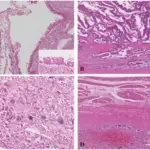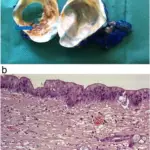Intraductal papillary mucinous neoplasms (IPMNs) are cystic tumors of the pancreas that grow within the pancreatic ducts and are capable of producing mucin.
What is the Pathology of Intraductal Papillary Mucinous Neoplasms (IPMNs)?
The pathology of intraductal papillary mucinous neoplasms (IPMNs) is:
-Etiology: The cause of intraductal papillary mucinous neoplasms (IPMNs) is not clear, associated with chronic pancreatitis, diabetes, and pancreatic ductal adenocarcinoma.
-Genes involved: KRAS and GNAS gene.
-Pathogenesis: The sequence of events that lead to intraductal papillary mucinous neoplasms (IPMNs) results from the progression of benign neoplasms to invasive growths through DNA mutation. The mutated DNA loses protecting factors and experiences malignant degeneration causing unrestrained growth and convalescence.
-Morphology: The morphology associated with intraductal papillary mucinous neoplasms (IPMNs) shows duct dilatation, bulky, solid, or gelatinous nodular area.
-Histology: The histology associated with intraductal papillary mucinous neoplasms (IPMNs) shows mucin-rich columnar cells, complex papillae.
How does Intraductal Papillary Mucinous Neoplasms (IPMNs) Present?
Patients with intraductal papillary mucinous neoplasms (IPMNs) typically affect more males than females present at an age range of 5th to 7th decades. The symptoms, features, and clinical findings associated with intraductal papillary mucinous neoplasms (IPMNs) include back pain, abdominal pain, nausea/vomiting, anorexia, jaundice, and unexplained weight loss.
How is Intraductal Papillary Mucinous Neoplasms (IPMNs) Diagnosed?
Intraductal papillary mucinous neoplasms (IPMNs) are diagnosed through radiological studies-MRI, MRCP, and CT scans assess the cyst characteristics. Endoscopic ultrasound (EUS) with fine-needle aspiration (FNA) evaluates cysts with malignant features.
How is Intraductal Papillary Mucinous Neoplasms (IPMNs) Treated?
Intraductal papillary mucinous neoplasms (IPMNs) are treated through surgical oncology.
What is the Prognosis of Intraductal Papillary Mucinous Neoplasms (IPMNs)?
The prognosis of intraductal papillary mucinous neoplasms (IPMNs) is fair with a 5-year survival rate of about 45 to 50%.



